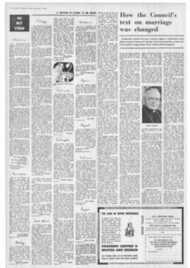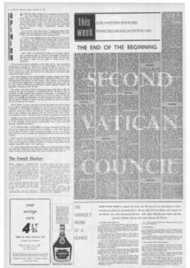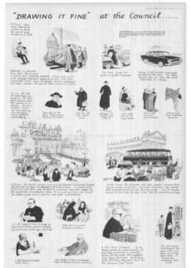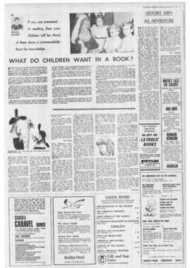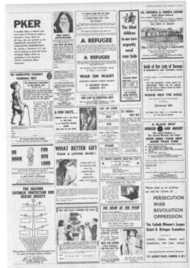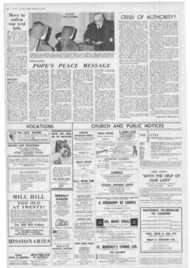Page 6, 10th December 1965
Page 6

Report an error
Noticed an error on this page?If you've noticed an error in this article please click here to report it.
Tags
Share
Related articles
Listen-in To Sunday, February 27: Christian Newe And...
The House That Jack Built
Listen-in To
Faults And Failings Of A Plaster Saint
From W.h Auden To Al Pacino
C. S. Lewis —
where he was only wisdom and
A REVIEW BY ELIZABETH JENNINGS
justice could prevail
11 AM PROBABLY one of -11the last of the generation which sat in the Hall of Magdalen College, Oxford. and listened entranced to the lectures of the late C. S. Lewis. Known by most of us as a tantalising religious apologist (a true "devil's advocate") and also as a great literary critic—he valued literature-rand poetry in particular. beyond anything that could ever be said about it---he was possibly at first sight something of a disappointment.
For one thing he looked so utterly unlike what one had expected: large, red-faced, beefy, possessed with a rotund and booming voice, he seemed remote from his own delicate, probing and always sensitive writing.
Soon, however, one realised
that the surprising appearance of the man did not manta at all. What mattered was his enthusiasm for literature, his desire to impart and share this enthusiasm, his great learning, and his compassion both for the ignorance and the innocence of the very young.
C. S. Lewis was at this time also a frequent familiar of the Socratic Club, a religiophilosophic society which met every Monday night of term to discuss ideas. Obviously, a society such as this tended to become the podium, or even soap-box, of the exhibitionistic and of all thinkers-aloud.
At all times C. S. Lewis was clear, witty, deferential, and kind. But he was also final, in that after he had clarified, with the utmost humility, the ideas of the most stupid members, nobody seemed to wish to talk any more nonsense. For the fact is that where C. S. Lewis was only wisdom and justice could prevail.
In Light on la S. Lewis, Jocelyn G ibb has gathered together a number of tributes to the man, none of which ever deteriorates, e v en for a moment, into mere adulation (Bles, I6s.). The best pieces in this collection are undoubtedly the most personal, those in which a close friend vays homage to C. S. Lewis both as a man and as a writer.
Certainly, the finest and most moving is Nevill essay entitled "The Approach to English". The two men met as undergraduates at Oxford and seldom lost touch with one another for several decades after that period.
Mr. Coghill makes some highly interesting statements, such as "His conversion to Christianity seems to have come about largely by thinking . . .", and "Genius is formidable and so is goodness; he had both".
All the contributions to this symposium stress the learning, enthusiasm and goodness of the man. Kathleen Raine, that tine poet, has something further to add. She writes: "Doubtless he would have agreed with Dom B ed e Griffiths that the function of art is `to evoke the divine presence'. One cannot take
seriously . literary discussion with those who believe less."
There is one notable gap-a presence felt, as it were, by its absence—in this book, and that is anything at all from J. R. R. Tolkien. One of C. S. Lewis's closest friends and the sharer both of many of his beliefs and his tastes, Professor Tolkien should surely have been included among those who paid tribute to, while throwing light on, C. S. Lewis.
If one admits this proviso, however, this collection of essays covers most aspects of C. S. Lewis — the scholar, writer, theologian, philosopher, apologist, autobiographer, and poet.
C. S. Lewis the poet is not a very familiar figure, even to those of us who know his other work well; the publication of his Poems, edited by Walter Hooper, enables us to assess this aspect of a many-sided man (Hies, 16s.).
What goes without saying is the extreme care and craftmanship of C. S. Lewis's verse. Here, one feels, is a man at ease not only among the classics but among most of the greatest literary forms of moire modern times.
But—and one says this reluctantly — C. S. Lewis's technical skill far outstripped his themes and subject-matter. He seems so seldom to have found either a subject which could dominate him COMplctely, or a way of stating old truths in a new, alive manner.
The general effect of his poetry is, then, that of exquisitely turned moulds into which rather uninteresting fluid has been poured. This may sound a harsh judgment, but C. S. Lewis is the last person who would have been grateful for that bleak charity which we call being "kind" to a dead man's work.
He always knew himself very well, as he shows in these lines front a pastiche of John Donne: From all my lame defeats and oh! much more
From all the victories that I seemed to score: From cleverness shot forth on Thy behalf At which. while angels weep, the audience laugh; From all my proofs of Thy divinity Thou. who wouldst give no sign, deliver me.
blog comments powered by Disqus



